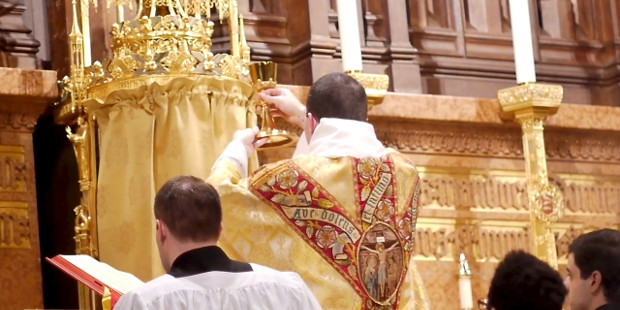The nonpossumus blog provides the link to this article:

Updated on Thursday, July 3, 2025, at 18:18 GTM2

Exclusive Diane Montagna
Pope Francis' report: Bishops did not ask to restrict Traditional Mass
Journalist Diane Montagna has exclusively revealed an unpublished report of the Congregation for the Doctrine of the Faith that casts doubt on the central argument of the motu proprio "Traditionis Custodes." The docuмent shows that most bishops did not support suppressing the Pontifical Summorum and warned of negative consequences for the unity of the Church. Exactly the opposite of what was said.
1/07/25 8:08 PM (
InfoCatholic) An exclusive published by
journalist Diane Montagna has brought to light an official Vatican docuмent that strongly questions the foundation of the motu proprio
Traditionis Custodes, with which
Pope Francis restricted in 2021 the use of the traditional mass in Latin, also known as an extraordinary form of the Roman rite.
The docuмent, a comprehensive evaluation of the consultation addressed in 2020 to the bishops by the Congregation for the Doctrine of the Faith (CDF), clearly indicates that
most of the bishops who responded to the questionnaire stated that
making legislative changes to Summorum Pontificuм would cause more harm than benefit. This statement directly contradicts what the pontiff stated in the letter accompanying the decree, in which he claimed to have acted following a majority petition from the world episcopate. This is what Francis said:
Thirty years later, I commissioned the Congregation for the Doctrine of the Faith to send you a questionnaire on the application of the Motu proprio Summorum Pontificuм. The answers received revealed a sting that saddens me and worries me, confirming the need to intervene.
The evaluation, prepared by the Fourth Section of the CDF, formerly known as the Pontifical Commission
Ecclesia Dei, not only points to the lack of consensus to suppress the motu proprio of Benedict XVI, but also highlights the positive fruits it had generated since its promulgation in 2007. He also called the performance that broke with the transparency habit of publishing the outcome of the consultation. All the pontiffs in those cases did and that despite the request to be published.
The report stresses that in places where
Summorum Pontificuм was applied with generosity and collaboration between bishops and priests,
a liturgical pacification was achieved, reducing previous tensions. In
addition, he stresses that
many young people - especially converts or distant Catholics,
have found in the traditional Mass a way back to sacramental life, attracted by its solemnity, the reverent silence and the doctrinal depth of the liturgy.
A constant observation collected in the episcopal responses is precisely the age of the faithful:
most stable groups are young and show a strong ecclesial commitment. The report highlights the
need to attend pastorally to these faithful and not to marginalize them, as proposed by Benedict XVI when he spoke of a liturgical reconciliation within the Church.
Also noteworthy is the
remarkable increase in priestly vocations in communities born or strengthened under
the protection of
Summorum Pontificuм. However, the report warns that
some bishops expressed discomfort at the fact that
seminarians chose
to enter institutes linked to the extraordinary form rather than diocesan seminars. As a possible solution, it is proposed
to include the study of both forms of the Roman rite in the priestly
formation plans.
The report also includes direct testimonies from bishops from different regions of the world, and concludes with a firm recommendation:
Let the people choose. This phrase, attributed to a Filipino bishop, summarizes the spirit of the docuмent: a call to liturgical freedom within the ecclesial unity, always under the authority of the bishop, but not excluding those who find spiritual food in the traditional liturgy.
The evaluation warns of
the risks of a reversal of
Summorum Pontificuм: mistrust of Rome, the rupture of the liturgical peace achieved and, in some cases,
the passage of faithful to schismatic groups. All this, according to the CDF, should be avoided for the sake of ecclesial communion.